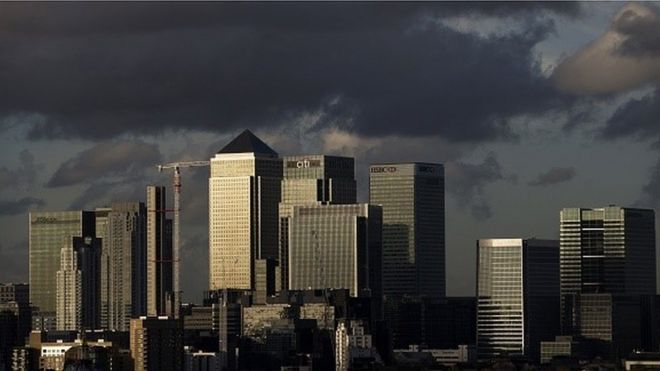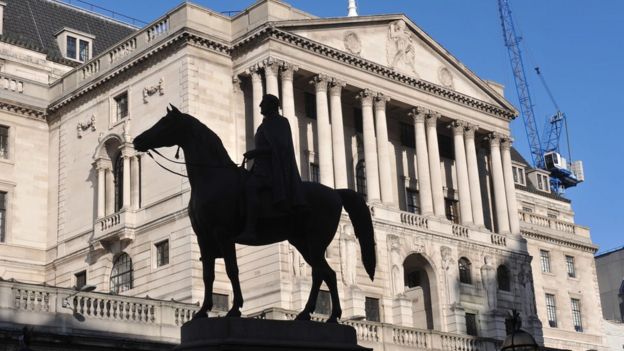 Image copyrightGetty Images
Image copyrightGetty ImagesThe man who led an inquiry into the future safety of Britain’s banks has said Bank of England plans are not strong enough.
Sir John Vickers, who headed up the Independent Commission on Banking (ICB), said: “The Bank of England proposal is less strong than what the ICB recommended.”
In a BBC interview, he added: “I don’t think the ICB overdid it.”
The Bank of England rebuffed the criticism.
Sir John has specifically questioned the plans to ensure that banks have enough capital.
Capital is considered vital to a bank’s safety, as it serves to protect it from sudden losses. It comes in many forms, but the most common is funding from shareholders, who expect a hefty return on the risk they are taking.
The backdrop to this news is the current slump in bank share prices across Europe. Since the start of the year, European banking stocks have lost a quarter of their value.
The Bank of England “might want to reflect on the turmoil we’ve seen in banking shares”, Sir John told BBC Radio 4’s Today programme.
“That’s a very important lesson that you have to get the basics right,” he said.
Insurance policy
Regulators, bankers and investors have been debating since the crisis just how much capital, and of what quality, will be needed for banks to survive the next crisiswithout another bailout from the taxpayer.
Royal Bank of Scotland and Lloyds Banking Group alone required a £65bn bailout, while all banks were aided by cheap funding.
Sir John, who has served as chief economist for the Bank of England and is now professor and warden of All Souls College, Oxford, says more capital is needed because no-one can predict the nature or scale of the next shock to the system.
High-quality capital in the form of shares is the best option, he says, in part because it is tried and tested.
“A good way to think about it is as an insurance policy,” he said. “You do have to pay a premium to insure your house and you hope nothing bad will happen. But if it does, you are much better off in paying that premium, and for full coverage.”
“If banks run out of capital, all sorts of havoc could ensue. We want to be in a position where there’s enough of a buffer to take any losses that might occur.”
Cheaper alternatives such as bonds which convert to high-quality capital – dubbed contingent convertible bonds (CoCos) – are untested.
“Other types of capital – CoCos, for example – and new forms of loss-absorbent bank debt are welcome but untested. Equity capital is the best shock absorber – even if you haven’t got a clue what’s going to hit you, it works.”
 Image copyrightGetty Images
Image copyrightGetty ImagesAuthorities have been criticised for what appears to be a softer approach to bank regulation. City watchdog chief Martin Wheatley, considered a tough regulator, was fired in the summer. The regulator then scrapped an inquiry into banking culture.
The ICB report recommended that the six largest banks should have 3% of extra capital in reserve compared to loans, when taking into account their risk. The new Bank of England suggestion is for a 2.5% buffer for the very largest, and as low as 1% for the smaller lenders of the six.
But the Bank of England said that it was in fact proposing “a higher level of capital and overall resilience” than was recommended in the ICB report.
It added that its proposals reflected the cost of the crisis as well as the benefits of more resilient banks.
“This judgement is informed by two years of severe but plausible stress tests,” a Bank of England spokesperson said.
“UK banks are now within touching distance of meeting these proposed new standards.
“On a comparable basis, globally systemic banks in the UK will be required to have ten times more capital than before the crisis.”
Sir John Vickers: How big a safety buffer should banks have?
The financial crash of 2008 exposed the Big Shortage – of bank capital. Some banks that had lent out, say, 40 times their shareholders’ capital couldn’t absorb their losses when loans went bad. Hence the taxpayer bailouts and further economic damage from bank lending seizing up.
The clear lesson is that banks, especially major banks providing core retail services, need much bigger safety buffers – more capital relative to loan exposures. Important progress has been made internationally and in the UK on this front, but a key policy question remains open: how big a safety buffer should major British banks have?
On 29 January, the Bank of England set out for consultation its proposed answer. The BoE expects that it would increase capital requirements, relative to banks’ exposures, by about 5%. Well worth having, but not ambitious. So on bank safety buffers, the BoE’s answer to the question “Are we nearly there yet?” is “Yes”.
‘Always risky’

I am not so sure. In 2011 the Independent Commission on Banking, which I chaired, recommended considerably stronger capital buffers for British retail banks. They would have significantly exceeded the buffers that some UK banks must have because of their global importance. That is not so true of the BoE proposals, which is why they add quite modestly to capital in British retail banking.
Who is right? Nobody knows. But that in itself is a reason for strong capital buffers. Large uncertainties, and the massive costs to society of systemic bank failures, call for ample insurance.
The main argument made against stronger buffers is rather a reason for them. Equity capital, it is said, is costly for banks because investors expect high returns. But high returns make sense only if they compensate for risk. It is in the public interest, however, to contain risks from banks – especially those providing core services such as current accounts – which is best done by more equity, not less.
Banking, as it involves lending, will always be risky to some degree. That’s fine, but only so long as capital buffers are strong enough to ensure that taxpayers aren’t again on the hook when things go wrong.
The worldwide fall in bank shares this year underlines the importance of the capital buffer question. The BoE might want to reconsider the answer.
[Source:-BBC]

